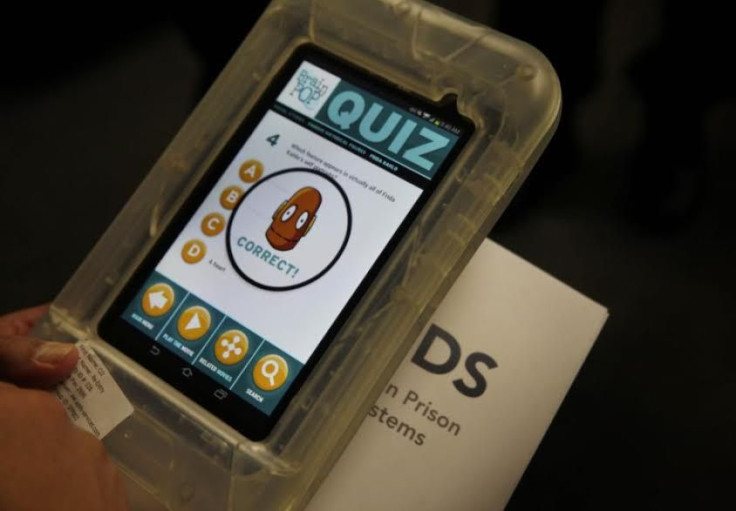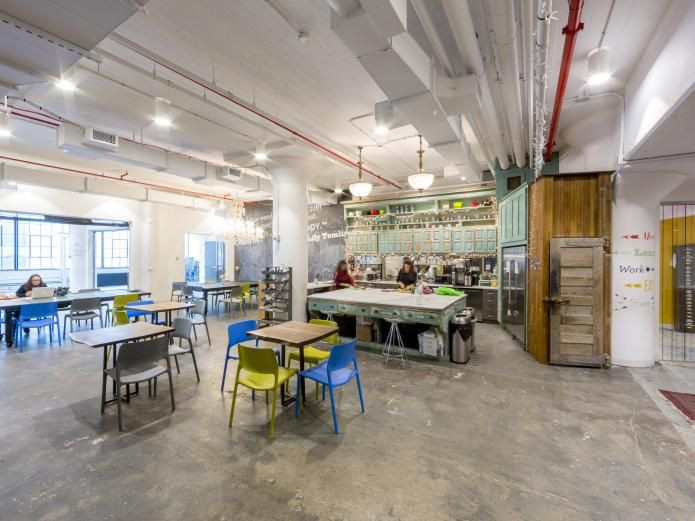Inside the Tech Startup That’s Building Tablets for Inmates

At first glance, APDS looks like your typical tech startup: a bunch of young, bearded guys hanging out and working on MacBooks in a cavernous loft in Manhattan. There's plush vintage furniture and chalkboard walls. There's even an antique canoe dangling inexplicably from the ceiling.
But look a little closer, and you'll see that APDS, which stands for American Prison Data Systems, is anything but your typical tech startup. Led by serial entrepreneur Chris Grewe, APDS is building tablets for prisoners. And business is good.
Of all the new tech gadgets to (legally) enter into the prison system, from MP3 players to personal TVs, tablets are quickly becoming the most popular. Starting around the beginning of 2014, the three major for-profit prison technology firms -- GTL, Securus and Telmate -- began offering inmates the option to purchase tablets loaded with music, movies and games.
But Grewe and APDS are trying to do something different.
Those companies are "selling pacification,” Grewe said over lunch at his company’s office recently. “We’re selling education.”

The APDS tablets come pre-loaded with a wide variety of educational tools. And rather than charge inmates for the tablets, Grewe and his team are selling directly to the correctional facility. The pitch? It will reduce violence in the jail, and it will ultimately lower the number of repeat offenders.
Since the first pilot program launched in June 2014, the idea has caught on. APDS has now secured contracts with facilities in California, Indiana and Kansas. And on Thursday, they’ll be rolling out their tablets in the Department of Probation in Westchester County, New York.
Rocco Pozzi, the probation commissioner in Westchester, says that he is “proud to be among the first programs in the nation to use tablet technology" that offers educational materials to "make a difference in the lives of young people.”
Reducing Recidivism
It’s common knowledge that providing education to young, first-time offenders drastically reduces the likelihood that they’ll end up back in jail. And going back to jail is expensive. Housing one inmate for one year, for instance, can cost a state around $30,000. So it stands to reason, then, that providing education to jails can reduce the facility's long-term costs.
One 2013 RAND Corporation study, for instance, looked at the cost effectiveness of providing education to inmates. Their results were clear: Spending money to educate a pool of 100 inmates would save a correctional facility about $1 million over a period of three years.
APDS sells the tablets at a cost ranging from $600 to $1,000, but Grewe believes they're well worth the expense and will ultimately lead to cost reductions for the correctional facility. The APDS tablets come equipped with Web-based assessment tests, virtual classrooms and even courses for the GED. They contain a digital law library as well as a more traditional e-library with hundreds of works of fiction and poetry.
The tablets are also built with a clever bit of gamification, too. When inmates complete assignments or finish reading a book or essay, they’re granted rewards, like the option to listen to a song they like. “Our entire idea is about lots of little carrots and lots of little sticks,” says Grewe.
Since the pilot launch last summer, APDS has sold about 600 tablets nationwide, but by the end of 2015, Grewe expects to sell as many as 6,000, which would generate nearly $4 million in revenue.
How It’s Made
On the surface the tablet doesn’t seem like anything special: It’s a 7-inch Samsung Galaxy that runs on Android. It connects to the Web via a Verizon 3G connection. But look under the hood, and you’ll see that it’s no ordinary tablet.
Grewe and his team spent two years building the tablet to be virtually unbreakable. A white-hat IT security firm recently certified that the tablet was unhackable, while its enclosure is built with military-grade plastic. It’s even built with an accelerometer that sends out an alert if the device is being thrown against the wall.
“There are murderers using this tablet in San Francisco,” Grewe says. “We need to make sure that no one can break it and turn it into a shank.”
Ethical Backwater
Over the last decade, country, state and federal jails have become more interested in how technology can improve their facilities. “There's now a huge market for tech in the prison industry,” says Jack Doneson, who runs a prison consulting firm in Manhattan. “But it’s a two-edged sword.”
That's because the way the technology is packaged isn’t always so great for the inmates and their families. For instance, Securus Technologies, a Dallas-based for-profit prison company, has recently begun offering video visitation services to inmates and their families -- while requiring the jails to remove free, in-person visits. The video calls can cost as much as $20 and Securus gives the jails a 20 percent cut of the business.
“Many of the companies in the corrections industry are rightly seen as carpetbaggers,” Grewe says. “They’re exploitative -- usurious.”

Grewe, however, is intent on breaking that stereotype. In addition to working with a variety of prison nonprofits, including the Fortune Society, Grewe has been strategic about positioning his company. He's incorporated APDS as a Public Benefits Corporation and rents office space inside the Center for Social Innovation, a coworking space, community center and "incubator for people who are changing the world."
Ultimately, the goal for Grewe -- in addition to growing APDS into a profitable company -- is to see the rates of incarceration decline.
"We're locking up people we don't need to lock up," Grewe says. "We can do better."
© Copyright IBTimes 2024. All rights reserved.






















